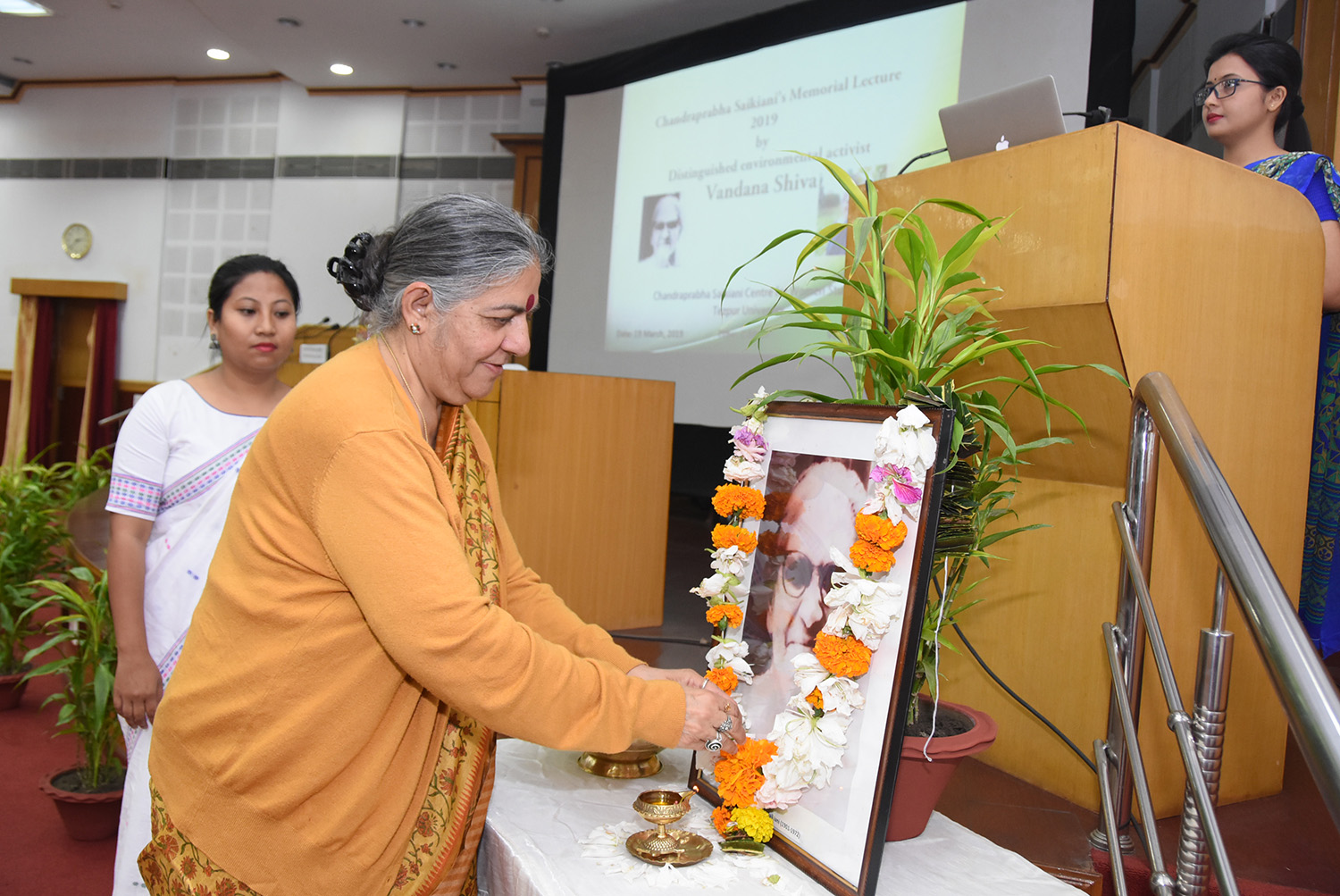-
Title of the events:
Chandraprabha Saikiani’s memorial lecture by distinguished environmental activist Dr. Vandana Shiva, 19th March, 2019
-
Place of event:
Tezpur University
-
Date
2019-03-19
-
Download the report

Event Description
On 19th March,2019 on the occasion of birth and death anniversary of Chandra Prabha Saikiani, the centre organised a lecture. The lecture was delivered by a distinguished environmental activist, Vandana Shiva. Vandana ma’am started with a joke of a scientist who tried to play with nature by exposing a chicken to the extreme cold. But in return the scientist died of pneumonia himself. Madam Shiva highlighted the importance of bio diversity and how important it is to preserve our biodiversity. She talked of seed monopolies leaving no alternative which has resulted in soaring prices of seeds which has compelled the farmers to commit suicide. Shiva said that our country has sufficient resources to feed the entire population of the country and we need not rely on others to feed us.
The colonization of seeds was highlighted by her. The East India Company ruled over us for many years and we are still a slave to them as we have left our traditional methods of cultivation and resorted to alternate ways of cultivation.
On being presented the Rigi-Rigang, the traditional Bodo Phalli, Shiva highlighted the importance of preserving our art and culture. It is important that our weavers keep the art of weaving intact. A great deal of satisfaction and hard work goes into weaving. Its an art which has to be learnt and a weaver can earn his livelihood through it. Shiva acknowledged Mahatma Gandhi’s ideology and his propagation of the significance of weaving especially khadi materials. Ma’am also mentioned Chandra Prabha Saikiani repeatedly about her effort in bringing women together in fighting against social evils and love for weaving.
We wear branded clothes like Adidas. Reebok, Van-Heusan etc but these products are created in the slave factories of the west where poor Bangladeshi woman are made to work like slaves. The art of sewing, weaving should be harnessed and machines should not be allowed to be dominated by machines.
The fashion industry is not static. Along with mill-made fabrics, handloom textiles need constant innovation, design input and facilitation. India is the only country that still creates textiles coming from the genius of its master weavers. The world has lost the hand-weaving and loom process, along with all natural and organic processes of creating textiles. Mill-made fabrics and synthetics largely dominate fashion markets, with China as the main example. India’s handloom industry is not the basket case it is made out to be. Its market for both saris and woven fabrics is largely the Indian subcontinent. There is no country that still has an indigenous fashion like India. Japan, China, or countries in South America or Africa have taken to clothing dictated to them by a Europe-Centric, multinational-funded fashion world.
One of the miracles of India is that we still have distinctive fashion handwriting, created by our craftspeople and designed by Indians. A large part of this miracle is due to the availability of organic textiles and their crafts. Textiles are the biggest employment generator in India after agriculture. Though the share of handloom in production is only 11% and the revenue of the sector is just Rs. 2,812 crores, it provides employment to 4.4 million weaver-families. The livelihoods of our weavers are an endangered part of our textile heritage and in recent years several weavers have committed suicide.
The sector also provides employment to women in poorer areas. Women who initially used to only spin yarn have taken up weaving and form a unique, potentially rich, eco-friendly cottage industry.Shiva is no fan of the Bill and Melinda Gates Foundation either, which she accuses of pushing a vision of agriculture based on GMOs and the use of fertilisers. The foundation,which supports the Guardian’s Global development site, is one of the biggest players in agriculture.
The US spend around $ 1bn every year on averting global hunger-but that includes supporting big farms-and, in 2009, the UK department for International Development (DFID) spent around £20m. In the past few years, the Gates Foundation has invested more than $2bn in trying to help smallholder farmers in Africa and Asia out of poverty. She accuses these corporate giants of wanting to take over the world’s seed supply through genetic engineering and patents by writing the World Trade Organization’s intellectual property rights treaty.
She stressed on the artificial intelligence that is destroying our crops. For her SEED is sacred in itself, every seed has life, when a seed is kept in an artificial environment it does not know how to survive in that environment and it disrupts its normal growing pattern. Most of our diseases are because of the food we consume and there is evolution of more diseases as we go down the lane.
Shiva strongly opposes golden rice, a breed of rice that has been genetically engineered to biosynthesize beta-carotene, a precursor of vitamin A. Shiva claims that Golden Rice is more harmful than beneficial in her explanation of what she calls the “Golden Rice Hoax”.
Seed is the biggest issue across democracy and it needs to be protected for the future generations. Vandana Shiva is fighting a war. A war against the Monsantos and global giants in the field of agriculture.


